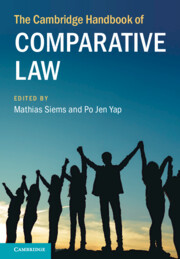Book contents
- The Cambridge Handbook of Comparative Law
- The Cambridge Handbook of Comparative Law
- Copyright page
- Contents
- Figures
- Tables
- Contributors
- Preface
- Abbreviations
- 1 Introduction
- Part I Methods of Comparative Law
- Part II Legal Families and Geographical Comparisons
- Part III Central Themes in Comparative Law
- Part IV Comparative Law beyond the State
- 28 Comparative International Law
- 29 Transnational Regulation
- 30 Quantitative Forms of Legal Governance
- 31 Comparative International Arbitration Law
- 32 Cross-Border Judicial Dialogue
- 33 Comparing Regional Law
- 34 Comparative Conflict of Laws
- 35 Comparative Indigenous Law
- 36 Comparative Legal Education
- Index
34 - Comparative Conflict of Laws
from Part IV - Comparative Law beyond the State
Published online by Cambridge University Press: 26 January 2024
- The Cambridge Handbook of Comparative Law
- The Cambridge Handbook of Comparative Law
- Copyright page
- Contents
- Figures
- Tables
- Contributors
- Preface
- Abbreviations
- 1 Introduction
- Part I Methods of Comparative Law
- Part II Legal Families and Geographical Comparisons
- Part III Central Themes in Comparative Law
- Part IV Comparative Law beyond the State
- 28 Comparative International Law
- 29 Transnational Regulation
- 30 Quantitative Forms of Legal Governance
- 31 Comparative International Arbitration Law
- 32 Cross-Border Judicial Dialogue
- 33 Comparing Regional Law
- 34 Comparative Conflict of Laws
- 35 Comparative Indigenous Law
- 36 Comparative Legal Education
- Index
Summary
Conflict of laws (or private international law) deals with cross-border legal relationships involving private parties. Methods of modern conflict of laws originate in Europe and largely remained intact until today despite modifications brought about by the US Conflicts Revolution. Other parts of the world, that is, Latin America, Asia and Africa, have not been on the centre stage. Even the recent globalisation discourse on legal pluralism and conflict of laws has principally focused on Western, developed countries, although the wave of globalisation affects the entire world. Countries in the Global South have been invisible presumably because, as former colonies, they are not readily accessible, are presumed not to have sophisticated conflicts rules, or are deselected by the choice of forum/arbitration clauses in cross-border business transactions. This chapter will deal with comparative conflict of laws from a non-Western viewpoint. This stance will allow for the relativising of the trends of conflict of laws in Europe and America and shed light on the recent debates on corporate due diligence and Sustainable Development Goals (SDGs) in conflict of laws by considering interests of the most affected and vulnerable people in the Global South. This chapter will also discuss future developments of conflict of laws treaties, which Asian and African countries have rarely joined so far.
- Type
- Chapter
- Information
- The Cambridge Handbook of Comparative Law , pp. 674 - 692Publisher: Cambridge University PressPrint publication year: 2024

